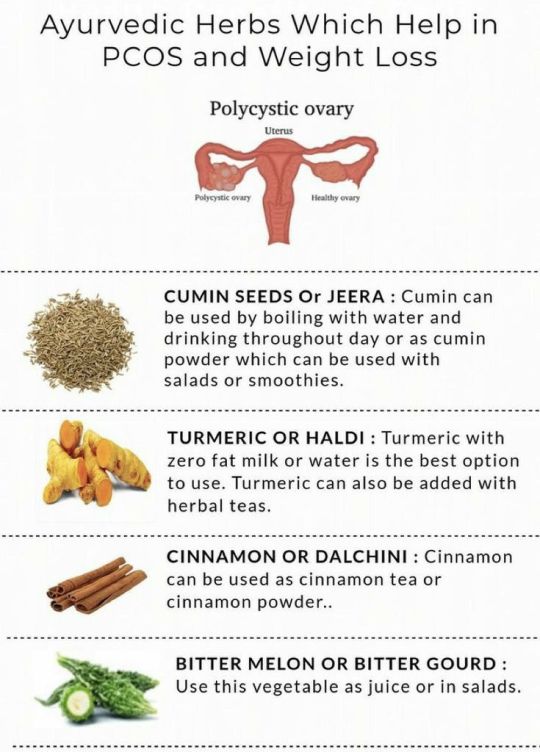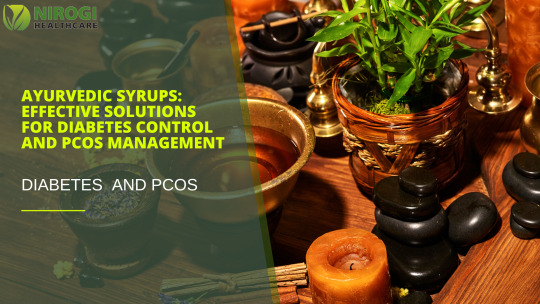#Ayurvedic treatment for pcos
Text

PCOS occurs due to long-term irregular mensuration problems. Our ayurvedic medicine consists of syrup, capsules and tablets. Helps in regaining reduces excess bleeding, and reduces itching and inflammation. The benefit of using an ayurvedic treatment for PCOS gives long-lasting relief without any side effects.
#Ayurvedic medicine for pcos#Ayurvedic medicine for pcod#Pcod treatment in ayurvedic#Ayurvedic treatment for pcos#Ayurvedic treatment for pcod#Pcod ayurvedic medicine
2 notes
·
View notes
Text
Ayurvedic Treatment for PCOS: Does it help in PCOS Reversal?

Polycystic Ovary Syndrome (PCOS) is a common endocrine disorder that affects millions of women worldwide. Characterized by irregular menstrual cycles, elevated levels of androgens (male hormones), and polycystic ovaries, PCOS can lead to symptoms such as acne, hair loss, weight gain, and infertility. Traditional Western medicine often treats PCOS with medications like birth control pills and insulin-sensitizing drugs. However, an increasing number of women are turning to alternative approaches, such as Ayurveda, to manage and potentially reverse their symptoms. But does Ayurvedic treatment offer a real chance at reversing PCOS? Let's explore this ancient system of medicine and its role in PCOS management.
Ayurvedic Diet for PCOS
Balancing Doshas: Ayurveda recommends a diet that balances the vata and kapha doshas. This often includes foods that are warming, hydrating, and easy to digest. For PCOS, this might mean incorporating more whole grains, fresh fruits, vegetables, and lean proteins while avoiding processed foods and excessive sugar.
Low Glycemic Index Foods: Foods with a low glycemic index can help manage insulin levels and are often recommended. Ayurvedic diets may include barley, quinoa, and leafy greens, which help stabilize blood sugar and reduce inflammation.
Ayurvedic Herbs for PCOS
Dhamasa Patti: Dhamasa patti, or Ficus racemosa leaves, is a traditional remedy often used in managing PCOS (Polycystic Ovary Syndrome) and PCOD (Polycystic Ovary Disease). Rich in anti-inflammatory and antioxidant properties, dhamasa patti helps in regulating hormonal imbalances, which are crucial in managing these conditions. It aids in reducing insulin resistance, improving menstrual regularity, and potentially lowering elevated androgen levels. Regular consumption of dhamasa patti can support overall ovarian health, promote the reduction of cysts, and help alleviate symptoms like excessive hair growth and acne. Always consult a healthcare provider before integrating new remedies into your treatment plan.
Siras Beej: Siras Beej can offer significant benefits for managing PCOS (Polycystic Ovary Syndrome) and PCOD (Polycystic Ovary Disease) that is why this ingredient is the hero ingredient in many ayurvedic PCOS relief capsules. Rich in antioxidants and essential oils, Siras Beej helps regulate blood sugar levels, which can alleviate insulin resistance—a common issue in these conditions. Its anti-inflammatory properties support overall hormonal balance and reduce the severity of symptoms like acne and excessive hair growth. Additionally, siras beej aids in digestion and can promote a healthy metabolism, which is crucial for managing weight, another key factor in PCOS and PCOD. Regular incorporation of Siras Beej into the diet may thus be beneficial in holistic management of these disorders.
Kachnar: Kachnar (Bauhinia variegata) is an herbal remedy often used to support women with PCOS (Polycystic Ovary Syndrome) and PCOD (Polycystic Ovary Disease). Its benefits stem from its potential to balance hormonal levels and improve insulin sensitivity. Kachnar is believed to help regulate menstrual cycles and reduce symptoms such as excess hair growth and acne, which are common in PCOS. Additionally, it may aid in managing weight and reducing inflammation, contributing to overall hormonal health. Always consult with a healthcare provider before starting any new treatment, especially if you have specific health conditions or are on other medications.
Lifestyle Modifications
Stress Management: Ayurveda emphasizes the importance of managing stress through practices like meditation, yoga, and deep breathing exercises. Stress can exacerbate hormonal imbalances, making stress management a crucial aspect of PCOS treatment.
Routine and Sleep: Establishing a regular daily routine and ensuring adequate sleep are vital for balancing the doshas and supporting overall health.
Detoxification
Panchakarma: This is a traditional Ayurvedic detoxification process that includes various treatments such as oil massages, herbal enemas, and detoxifying diets. Panchakarma aims to cleanse the body of toxins, which can improve metabolic and reproductive health.
Integration with Conventional Treatments
Many women find that integrating Ayurvedic treatments for PCOS with conventional medical approaches provides the best results. Ayurveda can complement traditional treatments by addressing lifestyle factors, stress management, and dietary changes that support overall health and well-being.
For example:
Diet and Lifestyle: Ayurvedic diet for PCOS and lifestyle changes can enhance the effectiveness of medications and improve overall health.
Herbal Supplements: Ayurvedic herbs can be used alongside conventional treatments to address specific symptoms and support hormonal balance.
Personalizing Your Approach
Every woman's experience with PCOS is unique, and what works for one person may not work for another. It's crucial to work with a healthcare provider who understands both conventional and alternative treatments. An integrative approach that considers individual needs, symptoms, and preferences can provide the best outcomes.
When considering Ayurvedic treatments for PCOS, it's also essential to consult with a qualified Ayurvedic practitioner who can offer personalized recommendations based on your specific dosha imbalances and health concerns.
Conclusion
Ayurvedic treatment offers a holistic and personalized approach to managing PCOS, focusing on balancing the body's energies, improving diet and lifestyle, and utilizing herbal remedies. While Ayurvedic practices have shown promise in supporting overall health and alleviating symptoms, they should be viewed as complementary to conventional medical treatments rather than a standalone solution.
With ongoing research and a growing interest in integrative health approaches, Ayurveda has the potential to play a significant role in managing PCOS. As with any treatment plan, it's essential to approach PCOS management with a comprehensive strategy that includes both conventional and alternative therapies, tailored to your unique needs and circumstances.
Kindly go through this website to get more informaiton:
#Ayurvedic Treatment For PCOS#improve PCOS symptoms#Ayurvedic Herbs for PCOS#Ayurvedic Diet for PCOS#Ayurvedic PCOS Relief Capsules#PCOS Relief Capsules#PCOS Relief Capsules for Women
0 notes
Text
PCOD problem treatment in Ayurvedic Solution Call 8010977000
PCOD Treatment with Ayurveda – One-Stop Solution by Dr. Monga Clinic
Polycystic Ovarian Disease (PCOD) is a common hormonal disorder affecting women, often leading to irregular menstrual cycles, weight gain, and fertility issues.
At Dr. Monga Clinic, we offer a holistic Ayurvedic approach to treating PCOD, addressing the root causes and promoting overall wellness. Our treatment focuses on balancing hormones, detoxifying the body, and improving reproductive health through personalized herbal remedies, dietary guidance, and lifestyle changes.
With a deep understanding of Ayurveda, our experts provide a one-stop solution to manage PCOD effectively and naturally.
For more queries or to start your treatment, consult us today at +91-8010977000.

#Ayurvedic Treatment for PCOS#Best Doctors For Pcos Treatment In Delhi#Best doctor for PCOS treatment in Delhi#How to cure PCOS permanently#PCOD specialist doctor near me#Best PCOS doctor near me#Best PCOS doctor in India
0 notes
Text
An ayurvedic treatment for irregular period

Our best ayurvedic medicine for irregular periods is made from natural herbs .
#ayurvedic medicine for pcos#ayurvedic medicine for pcod#pcod treatment in ayurvedic#ayurvedic treatment for pcos#ayurvedic treatment for pcod#pcod ayurvedic medicine#pcod ayurvedic treatment
0 notes
Text
Effective Ayurvedic Treatment for PCOS in Indore | Holistic PCOS Solutions
Discover the power of Ayurveda for PCOS treatment in Indore. Our specialized approach offers natural and holistic solutions for managing Polycystic Ovary Syndrome. Unlock well-being and hormonal balance with personalized care.
For more info, visit- https://www.drjyotiayurveda.com/PCOD-PCOS
0 notes
Text
Specialized Ayurveda Doctor for Female Infertility | Expert Treatment

Discover effective Ayurvedic treatments for female infertility at our dedicated clinic. Our experienced doctors offer personalized care for your path to parenthood
#ayurvedadoctorforinfertility#femaleinfertilitytreatment#ayurvedicinfertilityclinic#pcos doctor in indore#ayurvedic treatment for pcos#pcod ayurveda treatment#pcod treatment in indore#pcod doctor in indore#pcos treatment in indore
1 note
·
View note
Text

Our ayurvedic medicine regularizes mensutral cycle, boosts uterine health, controls blood sugar level, helps in weight management.
#Ayurvedic medicine for pcos#Ayurvedic medicine for pcod#Pcod treatment in ayurvedic#Ayurvedic treatment for pcos#Ayurvedic treatment for pcod#Pcod ayurvedic medicine
0 notes
Text

Alternative medicine to cure irregular mensuration problems, reduces itching, and inflammation heals the body which gives long-lasting relief without having any side effects. Ayurvedic treatment for PCOS using natural blend.
#Ayurvedic medicine for pcos#Ayurvedic medicine for pcod#Pcod treatment in ayurvedic#Ayurvedic treatment for pcos#Ayurvedic treatment for pcod#Pcod ayurvedic medicine
0 notes
Text
Ayurvedic medicine for PCOD is beneficial in the following ways:
•Hormone rebalancing drugs help to relieve symptoms of Poly polycystic ovarian Syndrome.
•Herbs like Shatavari, Shatapushpa, Guduchi, Krishna Jeeraka Sahachara are common herbs which are useful in treating PCOD
•Purificatory treatments like Abhyanga, Udwarthana, Dhanyamlaseda, Shirodhara, Virechana, and Vasti are useful in the management of PCOD.
#Ayurvedic medicine for pcos#Ayurvedic medicine for pcod#Pcod treatment in ayurvedic#Ayurvedic treatment for pcos#Ayurvedic treatment for pcod#Pcod ayurvedic medicine
0 notes
Text
Our Ayurvedic medicine for PCOS consists of all-natural ingredients that heals the body internally which increases women's strength and control irregular mensuration period giving long-lasting relief.
#Ayurvedic medicine for pcos#Ayurvedic medicine for pcod#Pcod treatment in ayurvedic#Ayurvedic treatment for pcos#Ayurvedic treatment for pcod#Pcod ayurvedic medicine
0 notes
Text
With the use of medicinal natural herbs, our ayurvedic medicine for PCOD is made up of. It gives relief from period pain and reduces itching and inflammation instantly. Cures irregular mensuration problems which helps in protecting reproductive organs.
#Ayurvedic medicine for pcos#Ayurvedic medicine for pcod#Pcod treatment in ayurvedic#Ayurvedic treatment for pcos#Ayurvedic treatment for pcod#Pcod ayurvedic medicine
2 notes
·
View notes
Text

Are you experience these symptoms of #PCOS/PCOD? You're not alone. Millions of women around the world are affected by this condition. But there is hope. #Ayurveda can help you manage your symptoms and improve your overall health.
Book An Appointment Now!!
https://www.kalpataru-ayurved.com/
#Ayurvedic treatment for PCOS#Ayurvedic treatment for PCOD#Ayurvedic Doctor#Ayurvedic Clinic#PCOD treatment#PCOS treatment
0 notes
Text
Ayurvedic Syrups: Effective Solutions for Diabetes Control and PCOS Management

In recent years, there has been a growing interest in natural and holistic approaches to healthcare. Ayurveda, the ancient Indian system of medicine, has gained significant recognition worldwide for its emphasis on balance and prevention. One area where Ayurveda has shown promising results is in the management of chronic conditions like diabetes and polycystic ovary syndrome (PCOS). In this article, we will explore the benefits of Ayurvedic syrups for diabetes control and PCOS management.
Ayurvedic Syrups for Diabetes Control:
Diabetes is a metabolic disorder that affects millions of people globally. While conventional medicine offers various treatments, many individuals seek alternative options to complement their diabetes management plan. Ayurveda offers a holistic approach by addressing the root causes of the condition.
Ayurvedic syrups formulated for diabetes control are typically crafted using a blend of potent herbs and natural ingredients. These syrups are designed to regulate blood sugar levels, enhance insulin sensitivity, and support pancreatic function. Key ingredients often found in Ayurvedic diabetes control syrups include bitter melon (Momordica charantia), fenugreek (Trigonella foenum-graecum), gudmar (Gymnema sylvestre), and neem (Azadirachta indica).
Bitter melon, for example, has been extensively studied for its hypoglycemic properties, which help reduce blood sugar levels. Fenugreek, on the other hand, aids in glucose metabolism and may improve insulin resistance. Gudmar is known as the "sugar destroyer" in Ayurveda and has shown potential in reducing sugar cravings. Neem, a powerful herb, supports blood purification and helps maintain healthy blood sugar levels.
Ayurvedic Syrups for PCOS Management:
Polycystic ovary syndrome (PCOS) is a hormonal disorder that affects women of reproductive age. It can lead to irregular periods, hormonal imbalances, and difficulty conceiving. While PCOS cannot be cured, its symptoms can be effectively managed through a comprehensive approach that includes lifestyle changes, diet modifications, and natural remedies.
Ayurvedic syrups formulated for PCOS management are often crafted using herbs and ingredients that help regulate hormonal imbalances and support reproductive health. Some common ingredients found in these syrups include Shatavari (Asparagus racemosus), Ashoka (Saraca indica), Lodhra (Symplocos racemosa), and Gokshura (Tribulus terrestris).
Shatavari is renowned for its hormonal balancing properties and is often used to support reproductive health in women. Ashoka and Lodhra are known for their benefits in managing menstrual irregularities and supporting a healthy uterine environment. Gokshura, on the other hand, may aid in maintaining hormonal balance and promoting overall well-being.
The Importance of Ayurvedic Approach:
Ayurvedic syrups for diabetes control and syrup for pcos management offer a holistic approach that considers an individual's unique constitution and imbalances. They aim to restore balance in the body, which is a key principle of Ayurveda. By addressing the underlying causes rather than merely treating symptoms, Ayurvedic syrups can provide long-lasting benefits.
It is important to note that Ayurvedic syrups should be used as part of a comprehensive treatment plan, which may include dietary modifications, exercise, stress management techniques, and regular medical check-ups. It is always advisable to consult with a qualified Ayurvedic practitioner or healthcare professional before incorporating any new treatment or supplement.
Ayurvedic syrups have shown promise in the management of chronic conditions like diabetes and PCOS. These syrups, formulated with a blend of natural ingredients, can support blood sugar control, enhance hormonal balance, and promote overall well-being. However, it is essential to adopt a comprehensive approach to healthcare and consult with experts to ensure personalized treatment plans. With the right guidance and commitment, Ayurvedic syrups can be valuable additions to a holistic wellness journey.
#ayurvedic diabetes control syrup#syrup for pcod#syrup for pcos#ayurvedic treatment for pcos#pcos best medicine in ayurveda
0 notes
Text

#ayurvedic medicine for pcos#ayurvedic medicine for pcod#pcod treatment in ayurvedic#ayurvedic treatment for pcos#ayurvedic treatment for pcod#pcod ayurvedic medicine#pcod ayurvedic treatment#ayurvedic#healthandwellness#herbal#healthcare#wellness#wellnessjourney
0 notes
Text
Effective Ayurvedic Treatment for PCOS in Indore | Holistic PCOS Solutions
Discover the power of Ayurveda for PCOS treatment in Indore. Our specialized approach offers natural and holistic solutions for managing Polycystic Ovary Syndrome. Unlock well-being and hormonal balance with personalized care.
For more info, visit- https://www.drjyotiayurveda.com/PCOD-PCOS
0 notes
Text
PCOD / PCOS
PCOS, or Polycystic Ovarian Syndrome, has become increasingly common among women of reproductive age in recent years. Women who have this condition may have irregular or altered menstrual cycles. The ovaries may also grow a lot of fluid-filled sacks that are incapable of releasing eggs. An endocrine disorder called PCOS/PCOD is a major contributor to infertility. Subfertility is a term used to describe a condition where a person is trying to get pregnant but is having a difficult time.
Best Ayurveda treatment for PCOD and PCOS
SYMPTOMS OF PCOS/PCOD
These are some of the typical PCOS/PCOD symptoms.
Period irregularities: Women may experience irregular menstrual cycles.
Missed Periods: Missed periods may occasionally last a long time. This may continue for several months.
Severe bleeding: This is caused by a thicker than usual uterine lining. Females can have prolonged periods of heavy bleeding.
Hair growth: The back, belly, chest, and face may all experience excessive hair growth. This ailment, also known as hirsutism, can be an annoying PCOS symptom.
Acne: Areas like the face, chest, and back are more likely to experience breakouts.
Obesity: Studies have shown that managing one’s weight can significantly lessen the symptoms of PCOS in up to 80% of females who have the condition.
Hair thinning and loss: Women with PCOS/PCOD may experience hair thinning and loss. The body’s overabundance of androgens is the cause of this.
Skin darkening: The nose, groin, under the breasts, and other places may develop dark skin pigmentation or patchy skin growth.
Headaches: A hormonal imbalance known as PCOS or PCOD can occasionally result in headaches.
Pelvic pain and fatigue: Women with PCOS may experience feelings of discomfort, such as pain in the pelvic area, along with fatigue.
REASONS BEHIND PCOS
High levels of androgen
A woman’s body contains a small amount of male hormones known as androgens. However, in PCOS, the amount of male hormones increases, which can prevent the ovaries from producing eggs during the monthly menstrual cycle. This can cause acne and excessive hair growth in women, which is one of the main symptoms of PCOS.
High levels of insulin
The insulin hormone is in charge of regulating the body’s glucose levels. PCOS is a condition in which many women have insulin resistance, which means that the glucose in the blood is not being used properly by their cells. Women are more likely than men to have a family history of Type 2 Diabetes. To avoid Type 2 Diabetes in the future, lifestyle changes are advised.Obesity and unhealthy lifestyle leads to PCOS
AYURVEDIC APPROACH TO PCOD/PCOS / Best Ayurveda treatment for PCOD and PCOS
According to the ancient texts of Ayurveda, it is referred to as “Granthi” in some cases, which refers to the development of abnormalities such as cysts, ulcers, lumps, or tumors. According to Ayurveda, PCOS is caused by imbalance of Rasa and Rakta Dhatus, as well as an imbalance in the three Doshas of the body (Vata, Pitta, and Kapha). These Rasa-Rakta Dhatus are weakened as a result of Dosha imbalance and Ama (toxins) buildup in the body. This can result in cyst formation and other PCOS symptoms.
Normally, the Vata Dosha dominates the reproductive system, and the female reproductive organs are made of “Artava Dhatu,” which nourishes the ovum. Vata Dosha is in charge of the follicle and ovum movement into the uterine fallopian tubes. The sub-dosha “Apana Vayu” is in charge of the downward flow or menstrual flow. Pitta Dosha is important for hormone production and balance in the body. The Kapha Dosha is in charge of nourishing and promoting follicle, uterine, and ovum tissue growth. As a result, a harmonious balance of the three Doshas is essential for producing healthy hormones and maintaining the health of the female reproductive system.
Best Ayurveda treatment for PCOD and PCOS
Ayurveda, as a holistic system of treatment, provides an all-encompassing treatment approach that addresses the underlying cause of this condition. This treatment can be tailored to an individual’s needs, and it is always best to consult an Ayurvedic expert before beginning any treatment or therapy. The goal of Ayurveda Treatment for PCOD is to-
Ayurvedic detoxification of the body to remove accumulated toxins
The female reproductive system should be strengthened, revitalized, and nourished.
Maintaining the body’s hormonal balance
Weight loss and insulin resistance correction
AYURVEDA DIET FOR MANAGING PCOS/PCOD SYMPTOMS:
The goal of following this Ayurvedic diet is to nourish the Aartava Dhatu in females.
Organic fruits and vegetables, such as raisins, pears, plums, dates, and figs, should be consumed by PCOS women. Fruits and berries in season should be included in the diet.
To boost the Agni (Digestive fire), avoid spicy foods, fermented foods, dairy products, buttermilk, and so on.
Consume Ragi (nachini, Eleusine coracana) grains.
Avoid taking added sugar or sugary foods, as well as artificial sweeteners.
AYURVEDA TREATMENT FOR PCOD INVOLVES-
Herbs like Ashwagandha, Turmeric, Shatavari, Varuna, Haritaki, Pippali, Bilva, Agnimantha, Punarvana, Guduchi, Chitraka, Shunthi, Dashmool, Shatapushpa, and others are very effective for balancing the tridoshas and Dhatus.
Panchakarma, ayurvedic therapies, Yoga and breathing exercises (Pranayama) . Dietary changes include increasing the consumption of fruits, vegetables, and whole grains while decreasing the consumption of saturated fats, salt, refined sugar, and refined carbs.
Varunadi Kashaya, Chitrakadi Vati, Triphala Guggulu, Punarvadi Kashaya, Shatavari Gulam, and other Ayurvedic formulations are effective.
PANCHAKARMA TREATMENT FOR PCOS/PCOD / Best Ayurveda treatment for PCOD and PCOS
Panchakarma Treatment is recommended to treat the underlying cause by removing toxins from the reproductive system and empowering the various organs such as the uterus, ovaries and Fallopian tubes. This Panchakarma Treatment also aids in the maintenance of the body’s hormonal balance.
Vamana
This is a cleansing technique used primarily to expel vitiated ‘Kapha.’ In PCOS, Vamana (therapeutic emesis or therapeutic vomiting) process helps to balance the vitiated kapha dosha.
Virechana
This therapy aids in the restoration of the vitiated Pitta Dosha. It involves cleansing the small intestine and improves Dosha elimination via the rectal route. It restores the female body’s hormonal balance.
Basti (Vastu)
This panchakarma therapy, which uses various types of herbal oils, Ghruta, milk, and other decoctions, is extremely effective in balancing the vitiated Vata Dosha. When specific oils are used for Basti, it aids in the regularisation of ovulation. So, Basti can help with infertility treatment, hormone balancing, PCOS treatment, fallopian tube blockage removal, and so on.
Uttarbasti (Vasti)
Uttarbasti (Vasti) is a highly effective treatment for gynecological conditions. In the case of PCOS, Uttarbasti aids in the dissolution of ovarian cysts, the flushing of the Aartava Vaha Srotas, the pacification of the vitiated Apana Vayu, and the increase of follicular maturity.
Fertility Massage
This is a gentle massage of the lower abdomen performed in a specific pattern to improve the natural functioning of the uterus. It also improves blood circulation in the lower pelvic region.
2 notes
·
View notes